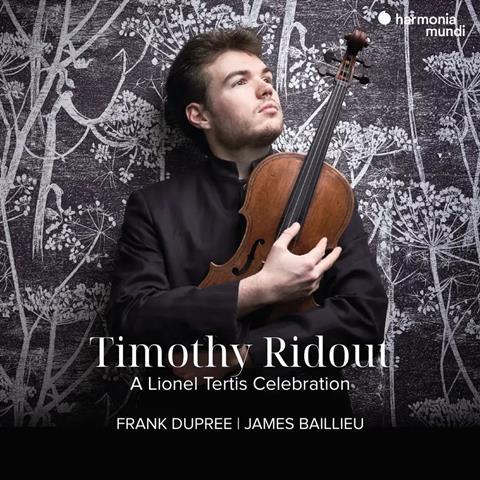A viola legend is celebrated by a star of a new generation

THE STRAD RECOMMENDS
The Strad Issue: April 2024
Description: A viola legend is celebrated by a star of a new generation
Musicians: Timothy Ridout (viola) Frank Dupree, James Baillieu (piano)
Works: Works by Beethoven, Bridge, Bowen, Brahms, Clarke, Coates, Fauré, Forsyth, Ireland, Kreisler, Mendelssohn, Reed, Schumann, Tertis, Vaughan Williams and Wolstenholme
Catalogue number: HARMONIA MUNDI HMM905376/77 (2 CDS)
Every viola player in the world has good reason to celebrate the life and work of Lionel Tertis, that indefatigable pioneer of the instrument who enlarged its repertoire as few others have. Few, however, have such a direct connection with the great man as Timothy Ridout, a Royal Academy of Music alumnus whose lineage goes back to Tertis himself, who taught there twelve decades ago. More importantly, Ridout obviously has a feel for the music from the Edwardian era which forms the core of this album.
Tully Potter’s erudite notes are an indispensable aid for charting Tertis’s relationships with the composers who wrote for him. Therein he takes the potentially perilous course of continually referring the listener to pioneering recordings of these pieces made by the likes of Tertis and William Primrose; but Ridout not only stands his ground in this illustrious company but belongs truly in the line of great viola virtuosos.
Read: Life Lessons: Timothy Ridout
Read: Violist Timothy Ridout: ‘People want to hear something different’
Watch: Violist Timothy Ridout and James Baillieu perform in Benjamin Britten’s library
If space allowed, I could spend much time pointing out the countless felicities that distinguish Ridout’s playing: the ringing double-stops adorning Mendelssohn’s Sweet Remembrance and Schumann’s Romance, the pointed spiccato and sonorous chord playing of Kreisler’s Pugnani pastiche, the sustained pianissimos in Ireland’s The Holy Boy or Tertis’s own Sunset. Ridout has obviously taken note of Tertis’s style as preserved in the aforementioned recordings, but has made it his own: his generously applied portamento never draws attention to itself, while his beautiful vibrato is addictive.
His pianistic collaborators come into their own in the two large-scale pieces that bookend the album: Frank Dupree tackles the virtuoso writing of Bowen’s First Sonata with aplomb and James Baillieu finds beautiful colours for Clarke’s impressionistic Sonata. I can’t recommend this warmly recorded set too highly, and hope that many sequels will be forthcoming.
CARLOS MARÍA SOLARE










































No comments yet